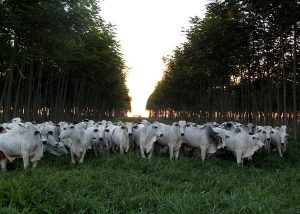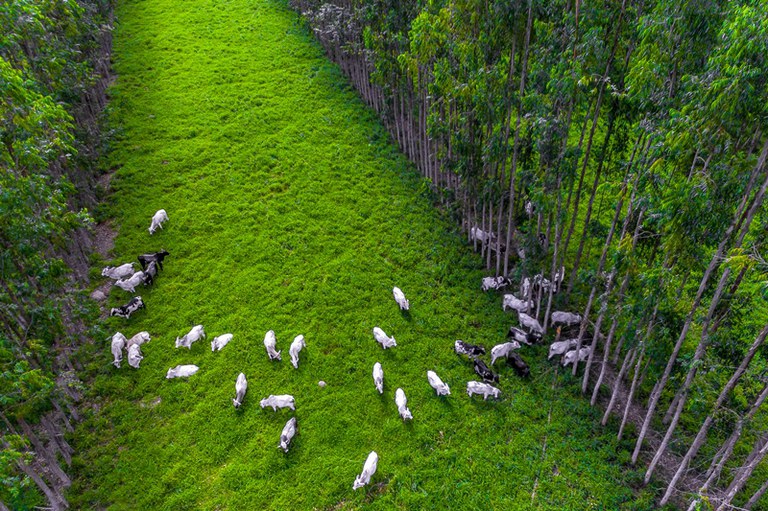São Paulo – Brazil is the first country in the world to have a Carbon-Neutral Meat (CCN, in the Portuguese acronym) seal. A protocol to offset methane emissions was developed based on research underway since 2012 by the Brazilian Agricultural Research Corporation (Embrapa), in partnership with meat packer Marfrig, which retains exclusive rights to the sale of goods under the label for the next ten years, after which time it will become public domain. For the time being, only the Santa Vergínia Agro farm in Mato Grosso do Sul boasts the certification. Seven independent certifiers are accredited to award the label. Certifiers can follow suit by joining a course from Embrapa.
Marfrig’s Viva Carne Carbono Neutro product line has been available at ten Pão de Açúcar stores throughout São Paulo since August 27. Other Brazilian capitals will follow. The meat company invested some BRL 10 million in the project with Embrapa, including research, property certification, brand development, development of meat cut standards, promotion, royalties, etc
“In encouraging sustainable production, we create value for the company as well as the business chain. Besides, the development of carbon-free meat in tandem with Embrapa, one of the foremost research and innovation centers in global agribusiness, reaffirms our commitment to four of the 17 Sustainable Development Goals from the UN’s Agenda 2030,” a press release quoted Marfrig CEO Miguel Gularte as saying. The four goals he mentioned are climate action, life on land, responsible consumption and production, and partnerships to achieve the goals.
According to Roberto Giolo, the leading researcher with livestock unit Embrapa Gado de Corte, this is the first initiative of its kind in the world. “A label of this kind of thing is very appealing in the corporate world and on international markets,” he told ANBA. Australia, a major beef-producing country, is expected to have a similar label only in 2030, he said.
Over 90% of CCN-labeled products will probably be exported, Giolo said. “This will increase the visibility of Brazilian meat. An independent certification process is required in addition to the Embrapa’s protocol. This is really interesting from the buyers’ perspective,” he said.
How it works
Giolo said the idea behind the seal is to address the problem of deforestation, promoting Brazil as a meat-producing country with exclusive product available. Production is still small-scale and should remain so for a while, because 200 trees need to be planted to offset yearlong emissions by four head of cattle, the researcher said.
He explained that farms must have separate grazing areas for the cattle and then plant the trees – usually eucalyptuses –, and the animals need to live among the trees so farms can get the carbon-neutral seal.
The three pillars of the seal, according to him, are carbon offsetting, animal wellbeing in terms of thermal comfort, and meat quality. According to Giolo, having trees in the pasture ensures that emissions of carbon – i.e. methane gas – are offset, and it also enable better living conditions for the animals by providing respite from the hot weather in Brazilian cattle farming states. This yields higher-quality meat, since the cattle doesn’t waste as much energy on regulating their body temperature, and it can be slaughtered at a younger age.

“We have included several management strategies in the protocol to enable improved meat quality. Animals enjoying thermal comfort will more weight and get slaughtered earlier, and younger meat is better meat. Moreover, grazing areas where there’s some shade give higher quality, more nutritious pasture, so that also leads to more weight gain in less time,” he said;
Farms are required to comply with all Brazilian deforestation laws. But how can one be sure that the meat available at supermarkets is really from cattle raised in pastures with the eucalyptuses? The protocol requires individual animal identification for traceability and end product quality, the researcher explained.
Certification doesn’t apply to the entire farm for the time being. At Santa Vergínia, 60% of the cattle is raised on tree-lined pastures, with plans to get to 100% by 2026, Giolo said. “It’s rare for a farm to be entirely silvopasture (forest and pasture), and this carbon-free system needs to be about silvopasture. You need everything in one area: the cattle, the trees and the pasture. You can’t just do it anywhere,” he said.
He believes pasture-forest integration is beneficial to the environment, as well to animal comfort and productivity. “The CCN certification is the crowning achievement in our dedication to an integration project which began in 2009,” a press release quoted Santa Vergínia Agro chairman Arthur Pollis as saying. Santa Vergínia, which supplies cattle to Marfrig.
Giolo said the Brazilian federal government’s low carbon emission agriculture plan, launched during the 2009-2010 crop, kickstarted the project. “That’s how our project came about. We applied that to beef cattle and we got carbon-free meat, which is specifically about livestock,” he said.
Halal
An international version of the label, Carbon Neutral Brazilian Beef, is intended for export. No halal labels are available at this time. “However, halal certifiers can get accredited by Embrapa to award certifications regarding the CCN protocol. In order to carry both labels, the animals must be sold to one of Marfrig’s halal meat packing plants,” Giolo said.
Additional information is available on the Embrapa website, including a downloadable Q&A on carbon-free meat.
Translated by Gabriel Pomerancblum




